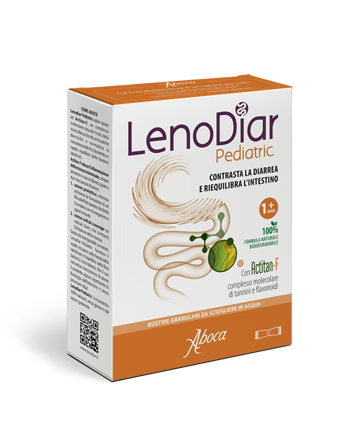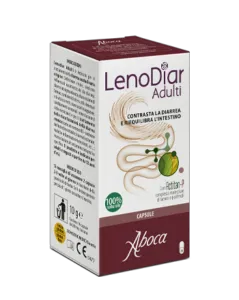LenoDiar Pediatric sachets
Counteracts diarrhoea and rebalances the intestine
The entire Products section of this website is an English translation of the official Italian Aboca website. It contains the list of Aboca products marketed in Italy and their related details. Please be aware that the information contained in each product data sheet is in accordance with Italian law only and may not reflect the legislation, regulations or other requirements applicable in your country.
Learn more
LenoDiar Pediatric is indicated for the treatment of diarrhoea. The product reduces the number of diarrhoeal episodes and respects the physiology of the intestine.
Diarrhoea is associated with irritation and inflammation of the intestinal mucosa of differing origin. It is characterised by increased secretion and/or decreased absorption of liquids, associated with increased intestinal motility.
Besides discomfort and pain, diarrhoea causes a risk of dehydration, loss of vitamins and mineral salts and an imbalance of the intestinal bacterial flora.
INSTRUCTIONS
LenoDiar Pediatric is indicated for the treatment of diarrhoea of various origin (viral infection, flu-like illness characterised by diarrhoea, functional diarrhoea, iatrogenic diarrhoea caused by medicines, traveller’s diarrhoea). Have the child drink a suitable quantity of liquids to avoid the risk of dehydration.
The product is indicated for ages 1 and up.
HOW IT WORKS
LenoDiar Pediatric acts thanks to Actitan-F, a plant-based molecular complex produced by Aboca research that reduces the number of diarrhoeal episodes and normalises the consistency of the stool, promoting a rapid stabilisation of the intestinal functions.
Actitan-F counteracts the inflammation of the intestinal mucosa present in cases of diarrhoea thanks to two mechanisms of action:
1. a protective effect, obtained by forming a film with a barrier effect that limits contact with microorganisms and irritants;
2. an antioxidant effect on free radicals, counteracting the irritation of the mucosa.
Thanks to the synergy between the mechanisms of action, LenoDiar Pediatric promotes the rapid recovery of intestinal function and the rebalancing of the bacterial flora (microbiota).
The product's mechanism of action respects the physiology of the intestine and does not cause constipation.
LenoDiar Pediatric is a gluten-free product with a pleasant flavour.
Read the warnings and instructions for use carefully.
Instructions for use
Take 1 sachet every 3 hours up to a maximum of 4 sachets per day, depending on the intensity of the disorder. Dissolve the contents of one sachet in 10 ml of water (about 1 spoon). If diarrhoea doesn't improve or worsens despite treatment consult a doctor.
Composition
Functional ingredients: Actitan-F, a plant-based molecular complex with tannins (from Agrimonia, Tormentilla) and flavonoids (from Chamomile).
Titrated in total tannins ≥ 7.8%
Also contains: lyophilized blueberry, blackberry, and elderberry juice, cane sugar, natural aroma and lemon aroma, lemon essential oil, gum arabic.
Warnings
Do not use in case of individual hypersensitivity or allergies to one or more components. In the event that symptoms don't improve, seek medical advice. Store at room temperature, away from heat sources and protected from light.
Keep out of reach of children. The expiration date applies when the product is intact and stored properly.
Scientific evidence
EFFICACY TEST
The innovative formulation used for LenoDiar Pediatric is the result of an in-depth research programme that confirmed efficacy by means of specific tests:
- HEALING AND BARRIER EFFECT: interaction between LenoDiar and the intestinal mucosa
FeCl3 colouration test.
The presence of tannins and their interaction with the intestinal mucosa was evaluated.
The test was conducted using various dilutions of the product (10%, 5%, 1% and 0.1%) in distilled water, which were applied to the mucosa of murine small intestine and colon. After washing and treatment with 2% FeCl3 the characteristic colours produced by tannins and proteins were detected.
show image
Adhesion of LenoDiar to the glycoproteins of intestinal cells and persistence for over two hours (mucoadhesion test on Caco2 cells - University of Catania).
Specific mucoadhesion tests can establish a substance's ability to adhere to the mucosa: a 1:5 dilution of LenoDiar Pediatric adheres to 44.5% of the sites available on the mucosa. The experiment was conducted on intestinal cells (Caco-2) isolated from an adenocarcinoma of the colon. The mucoadhesion of the product was determined by evaluating the product's ability to adhere to the cells and was measured by means of a spectrophotometer.
Adhesion persisted for over 2 hours
show image
LenoDiar Pediatric adheres effectively to the mucosae, holding fast for over 2 hours even when subjected to a flow of gastrointestinal juices at a pH of 3.5
Adhesion between Actitan and mucin, the main protein in mucus (University of Pavia).
A sample of the mix of active ingredients in the product (Actitan-F) was placed on an inclined plain with a biological support of mucin 8% w/w.
show image
Measuring began when the plain was inclined at 45°. The formulation was allowed to drain onto a high precision scale. The quantity of the sample that drained off was plotted over time. Measurements were also taken in the absence of mucin (control): in this case the sample was placed directly on the inclined plain. The control is used to evaluate the intrinsic flow of the sample, independently of its ability to interact with mucin.
The adhesion of Actitan F to the inclined plane covered with mucin was over 2 times greater than for the inclined plain without mucin (control) demonstrating an excellent ability to interact with mucin.
Adhesion of LenoDiar to mucus-secreting cells (Natural Biomedicine)
Mucus adhesion on an inclined plane with Caco-2 cells was studied using both the mix of active ingredients and the product. Both the mix of active ingredients and the finished product adhere to the cells. The test shows the affinity of the product for intestinal cells and means prolonged adhesion along the intestinal tract can be considered likely.
Actitan protects the intestinal mucosa from irritant stimuli (Ussing chamber test, pH 6.5 University of Milan).
The (Ussing chamber) test shows that LenoDiar is able to preserve the integrity of the mucosa against injury by irritative stimuli (change in pH).
Briefly, the integrity of murine ileal and colonic mucosa was measured by TEER (trans epithelial electric resistance) both at physiological pH (pH 8) and after acidification with HCl (pH 6.5), using an Ussing chamber. The negative control was the measurement of the untreated mucosa, while the experiment called for the presence of Actitan in the acidified solution.
The objective was to create conditions that would mimic the action of the “dissolved” product in the lumen of the intestine and in contact with the mucosa of the small intestine and colon.
show image
Since hydrochloric acid causes mechanical injury, damaging the integrity of the mucosa, the degree to which the mucosa retained its integrity under acidic conditions is directly proportional to the mechanical protective effect produced by the sample. The graph shows a loss of resistance at the moment of acidification in the untreated mucosa, the presence of Actitan-F protects the mucosa with values close to those of the intact untreated mucosa at a pH of 8.
These results are in agreement with the data on mucoadhesion in acidic environments.
- SEQUESTERING EFFECT ON VIRAL AND INFLAMMATORY PROTEINS
LenoDiar, thanks to Actitan, binds to and precipitates out almost all the NSP4 in the solution.
show image
The same test was also conducted with the inflammatory protein Interleukin-6 (IL-6) with comparable results.
- ANTIOXIDANT ACTION
The antioxidant effect of LenoDiar, demonstrated through multiple tests (e.g. DPPH, FRAP, ORAC, AAPH), protects the intestine and the bacterial flora from the oxidative stress created by an excess of free radicals. Here are the results of one of the tests mentioned above:
Evaluation of the protective effect against damage caused by a pro-oxidant stimulus (AAPH)
show image
In this test, which was conducted on Caco-2 intestinal cells, cells were stimulated to produce free radicals by treating them with the pro-oxidant agent AAPH (2,2'-azobis(2-amidinopropane) dihydrochloride). The free radicals produced, in an intracellular or extracellular environment, are detected by incubating the cells with a colourant that binds to free radicals.
Colouration is directly proportional to the proportion of free radicals present in the specimen. By incubating the cells with AAPH and with LenoDiar, vitamin C (positive control) or nothing (negative control) the protective capacity of the product is evaluated against a pro-oxidant stimulus.
The graph on the side shows that the product has a protective effect similar to that of vitamin C.


